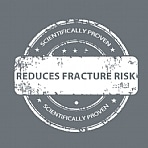
Study objective:
Comparing the effects of amorphous calcium derived from either Gastrolith or synthetic amorphous calcium carbonate with those of crystalline calcium, found in most popular crystalline calcium carbonate (Caltrate, Pfizer) or citrate (GNC) supplements, in an osteoporosis model in animals.
Study description:
Study results:
Amorphous calcium carbonate (ACC) demonstrated:
The study was published in “Health” scientific journal, in a special edition dedicated to new break-through treatments for osteoporosis:
Galit Shaltiel, Elad Bar-David, Oren E. Meiron, Eitan Waltman, Assaf Shechter,
Eliahu D. Aflalo, David Stepensky, Amir Berman, Berdine R. Martin, Connie M. Weaver & Amir Sagi. Bone loss prevention in ovariectomized rats using stable amorphous calcium carbonate (2013) Vol.5, No.7A2, 18-29.
שתפו:
מוצרים נוספים
מאמרים נוספים

היתרונות של סידן אמורפי בטיפול באוסטאופורוזיס
Please select a template first
